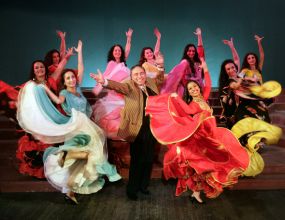 Photos: The Romen Theater (teatr-romen.ru)
Photos: The Romen Theater (teatr-romen.ru) Portal ROMI.HR razgovarao je s istaknutim romskim glumcem iz Rusije i umjetničkim ravnateljem moskovskog romskog narodnog kazališta "Romen" Nikolajem Sličenkom.
Prijevod: Daria Maracheva
Nikolaj Sličenko je na čelu kazališta Romen od 1977. godine. Osim toga što je poznati glumac i umjetnički ravnatelj kazališta "Romen", također je i kazališni redatelj, pjevač, pedagog i javna osoba. Nikolaj Sličenko dobitnik je više od 30 državnih nagrada. Nikolaj Sličenko je jedini Rom kome je dodijeljeno priznanje "Narodni umjetnik SSSR-a".
Koje ciljeve su nastojali ostvariti romski intelektualci zalažući se za osnivanje profesionalnog romskog kazališta? Kako je osnivanje kazališta "Romen" utjecalo na Rome u Rusiji? Na koji način je osnivanje Kazališta doprinijelo promjeni percepcije romske umjetnosti i kulture u Rusiji i u inozemstvu?
U krugovima romskih intelektualaca se 1930. godine pojavila ideja osnivanja romskog kazališta kao središta očuvanja i razvoja romske kulture. Ovu ideju je podržao Anatolij Lunačarski (Op.ur. - sovjetski ministar obrazovanja) ne samo zbog toga što su tokom ovog razdoblja u Sovetskom Savezu su se počeli otvarati nacionalna kazališta. Otkad su se Romi naselili u Rusiji, rusku kulturu nije moguće zamisliti bez Roma i romskih pjesama. U epicentru osnivanja Kazališta bio je ugledni romski književnik Ivan Rom-Lebedev i redatelj Moisej Goljdblat, koji je postao prvi umjetnički ravnatelj Kazališta.
 Svečano otvaranje Indo-romskog studija dogodilo se 24. siječnja 1931. godine, a 16. prosinca glumci su prikazali svoju prvu glazbeno-dramsku izvedbu prema drami Aleksandra Germana "Život na kotačima". Predstava govori o teškom prijelazu Roma na sjedilački način života, o mladima koji raskidaju s prošlošću. Nakon premijere studio je pretvoren u romsko kazalište "Romen". Naravno, to je nadahnulo Rome u različitim zemljama na otvaranje nacionalnih kulturnih institucija. Profesionalne kazališne kampanje su se pojavile u brojnim europskim zemljama, ali puno kasnije.
Svečano otvaranje Indo-romskog studija dogodilo se 24. siječnja 1931. godine, a 16. prosinca glumci su prikazali svoju prvu glazbeno-dramsku izvedbu prema drami Aleksandra Germana "Život na kotačima". Predstava govori o teškom prijelazu Roma na sjedilački način života, o mladima koji raskidaju s prošlošću. Nakon premijere studio je pretvoren u romsko kazalište "Romen". Naravno, to je nadahnulo Rome u različitim zemljama na otvaranje nacionalnih kulturnih institucija. Profesionalne kazališne kampanje su se pojavile u brojnim europskim zemljama, ali puno kasnije.

Skoro od samog početka svog osnivanja, pojavilo se pitanje kakva će biti koncepcija Kazališta, odnosno hoće li "Romen" biti muzičko ili dramsko kazalište. Nakon 90 godina koji od ova dva pravca Kazalište smatra svojom jačijom stranom?
Romska umjetnost je uvijek spoj muzike, pjevanja i glume. Sve naše izvedbe se ističu svojom sjajem i pristupačne su za svakog gledatelja zahvaljujući mnoštvu scena koje uključuju pjesme i ples i kojima ne treba prijevod.
Koliko je glumaca u glumačkoj trupi "Romen"? Koliki postotak njih su Romi? Koliki je ukupan broj zaposlenih u kazalištu "Romen"?
U trupi je 58 glumaca, od kojih su većina Romi. Mi smo nacionalno kazalište. Kazalište ukupno ima 150 zaposlenih.
Ove godine se navršava 90 godina od osnivanja kazališta "Romen". Koje povijesno razdoblje je bilo najteže? Je li se "Romen" suočavao sa situacijom da je Kazalište bilo na pragu da bude zatvoreno? Koje razdoblje se smatra najuspješnijim u povijesti Kazališta, odnosno razdobljem njegove najveće popularnosti među publikom? S čime je to povezano?
Najteže razdoblje za Kazalište, kao i za cijelu zemlju, bilo je ratno razoblje (Op.ur. - razdoblje Drugog svjetskog rata). Glumci u sastavu brigada na frontu nastupali su u bolnicama i na frontu, jačajući borbeni duh vojnika. Tek 1944. godine Kazalište se vratilo u Moskvu, "Romen" je počeo obnavljati svoj repertoar, a 9. svibnja 1945. godine kazališni glumci nastupali su na Crvenom trgu slaveći pobjedu u Ratu.
Svaka generacija glumaca smatra razdoblje svog rada u Kazalištu najuspješnijim, a svoje uloge najupečatljivijim i to je razumljivo, takva je priroda glumaca.
Koliko predstava je izvedeno u cijeloj povijesti kazališta "Romen" i koliko gledatelja je prisustvovalo tim predstavama? Koje izvedbe se smatraju najuspješnijima?
Teško je reći, ali sigurno više od stotinu predstava, kojim je prisutstvovalo, prema najkonzervativnijim procjenama, više od 50 milijuna gledatelja. Naša posjetnica je predstava "Mi smo Cigani". Dana 26. lipnja 2021. godine se navršava 45 godina od prve izvedbe predstave. Predstava je retrospektiva života Roma, od trenutka kada su napustili Indiju sve do trenutka kada su Romi stupili na rusko tlo. Putujući po svijetu, romski narod je ostavio svoj trag svugdje. Prilagođavao se novim uvjetima i preživljavao je. Duh slobode i vječnog lutanja je došao do izražaja u pjesmama i igrama koje se izvode s nevjerojatnom strašću i temperamentom. Sve to prate zapanjujući muški i ženski vokali, ritam gitare, zvuk violina i strasni plesovi. Vlada atmosfera stalnog praznika, unatoč poteškoćama kroz koje prolazi romski narod.
U koliko zemalja je kazalište "Romen" bilo na turnejama? Znate li slučajeve kada je dolazak kazališta "Romen" na turneju motivirao Rome u pojedinoj zemlji na osnivanje romske kazališne trupe ili ansambla?
Kazalište je posjetilo više od 30 zemalja svijeta. U Jugoslaviji smo bili 1983. godine, 17 puta smo igrali našu glavnu predstavu "Mi smo Cigani". Tada je to bila jedna zemlja.
Godine 2019. otišli smo na turneju u Rumunjsku. Tokom našeg boravka u Rumunjskoj predstavnici Ministarstva kulture su s nama raspravljali o ideji otvaranja romskog kazališta u Bukureštu.
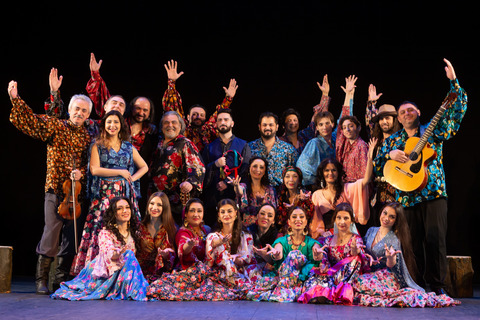
Kako se mijenjala popularnost kazališta "Romen" u odnosu na sovjetsko doba?
Naravno, naši odani obožavatelji i njihovi idoli postali su odrasli ljudi, to je sasvim normalno. Mladi glumci rade u suvremenom stilu, traže nove oblike interakcije s publikom i nadam se da ni u budućnosti Kazalište neće izgubiti svoju popularnost.
S kojim izazovima se kazalište "Romen" suočava danas? Kako je pandemija COVID-19 utjecala na rad Kazališta?
To je bila vrlo teška godina, glumcima je bila uskraćena mogućnost komunikacije s publikom uživo. On-line format postao je novi oblik interakcije s gledateljima, sada radimo uz popunjenost do 50% u skladu sa svim zahtjevima Rospotrebnadzora (op. ur. - Služba za nadzor zaštite prava potrošača Ruske Federacije). Nadamo se da ćemo se uskoro moći vratiti u normalan život.
Iz kojih izvora se kazalište "Romen" financira? Koliko je Kazalište samostalno u određivanju svog godišnjeg repertoara?
Kazalište se financira iz proračuna Grada Moskve. Odjel za kulturu, u čijoj nadležnosti je Kazalište, ni na koji način ne ograničava slobodu stvaralaštva i ne miješa se u repertoarnu politiku.
Kazalište "Romen" je vjerojatno najpoznatije romsko kazalište na svijetu i ima najdužu povijest. Istovremeno, tokom zadnjih 30 godina osnivana su i druga profesionalna romska kazališta poput slovačkog kazališta "Romathan", ukrajinskog glazbeno-dramskog kazališta "Romans", kazališta " Das TKO" u Njemačkoj itd. U kojoj mjeri, prema vašem mišljenju, osnivanje romskih kazališta u drugim zemljama doprinosi buđenju nacionalne svijesti Roma kao i podizanju svijesti o romskoj kulturi i umjetnosti u zemljama u kojima se takva romska kazališta osnivaju?
Bez znanja i razumijevanja kulture i mentaliteta susjednih naroda nije moguće uspostaviti komunikaciju među ljudima na prijateljski i tolerantan način. Uz to, važno je očuvati nacionalni identitet naroda, a kultura i umjetnost tome pridonose u najvećoj mjeri.
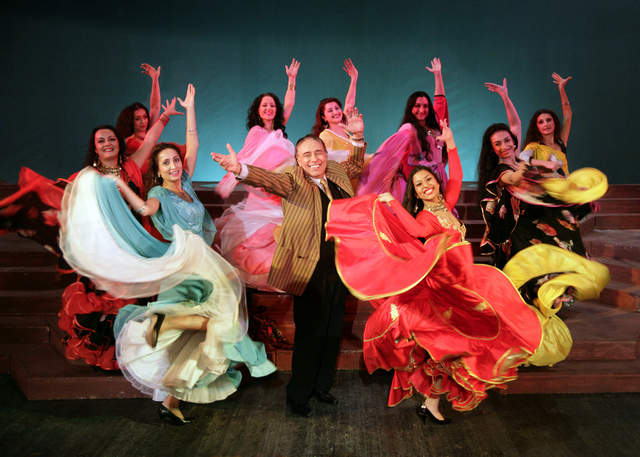
Vi ste izvanredan sovjetski i ruski umjetnik, koji je još u mladosti počeo raditi u kazalištu "Romen". Koliko teško (ili lako) bilo je nadarenom mladiću romskog podrijetla dobiti posao u moskovskom ili nekom drugom kazalištu u sovjetsko doba? Je li se situacija promijenila danas?
Prvi put sam čuo za kazalište "Romen" nakon rata (op. ur. – Drugi svjetski rat), kada je moja majka poslala meni, dječaka, k rođacima u romski "Kolhoz" (Op.ur. – vrsta seljačke radne zadruge u Sovjetskom Savezu). Bio sam oduševljen. Pomagao sam odraslim koliko sam mogao. A navečer mladi ljudi su se okupljali oko vatre i više puta sam čuo: "Trebaš raditi u kazalištu "Romen!" Znali su da postoji takvo kazalište. Prošlo je nekoliko godina i naše starješine donose odluku skupiti po nekoliko kilograma pšenice od svakog Roma, prodati ih i za ovaj novac kupiti mi kartu za Moskvu. Čitav "kolhoz" je došao da me isprati. Bilo je i suza, i radosti, i straha. Straha, jer nisam znao što me čeka. Imao sam 17 godina. Bio sam dječak. Naravno da sam bio zabrinut. Ali s druge strane sam znao da možda i neće biti druge šanse da ostvarim svoj san.
U Moskvu stižem rano ujutro. Nekako sam stigao do ulice Gorkog, odnosno do uličice Gnezdnikovskaja, gdje se tada nalazio "Romen". Kucam na vrata. Sedam je sati ujutro. S druge strane vrata su svi zbunjeni: "Što je bilo?! Tko se zeza?! Odgovaram: "Došao sam raditi u Kazalište." Smiju se: "Jesi li poludio? Dođi u jedanaest." Do jedanaest su počeli dolaziti glumci. Pitaju me: "Tko? Gdje? Zašto?" Objašnjavam kako znam. Čekam. U pauzi se cijela trupa okuplja na moju audiciju. Otpjevao sam. Nema reakcije. "Možete li nam nešto recitirati?" Jedva se sjetim kako mi je mama jednom čitala "Usamljeno jedro bijeli" (Op.ur. – prvi stih pjesme "Jedro" čuvenog ruskog pjesnika iz XIX. stoljeća Mihaila Ljermontova). Recitiram. Opet tišina. "Znaš li plesati?" Plešem. Iznenada ustaje mladi Sergej Šiškov, tadašnji prvak Kazališta i viče: "Napokon, dobio sam zamjenu!" Skoro sam pao od ove izjave. Odmah se čuje aplauz. Ukratko, bio sam prihvaćen. Postao sam pomoćni glumac kazališne trupe.
Danas takva situacija gotovo da nije moguća. Naši mladi glumci diplomiraju na kazališnim akademijama, naša nacionalna specifičnost uvjetovala je praksu osnivanja posebnih programa za Rome kako bi se popunila kazališna trupa (Op.ur. – takvi posebni programi za Rome osnovani su kao dio čuvene Muzičke akademije "Gnesini" i Dramske akademije "Ščukina").
*Članak s više informacija o nastanku moskovskog romskog kazališta "Romen" možete pročitati na našem Portalu: https://romi.hr/zanimljivosti/hrvatska/devedeseta-godisnjica-kazalista-romen.
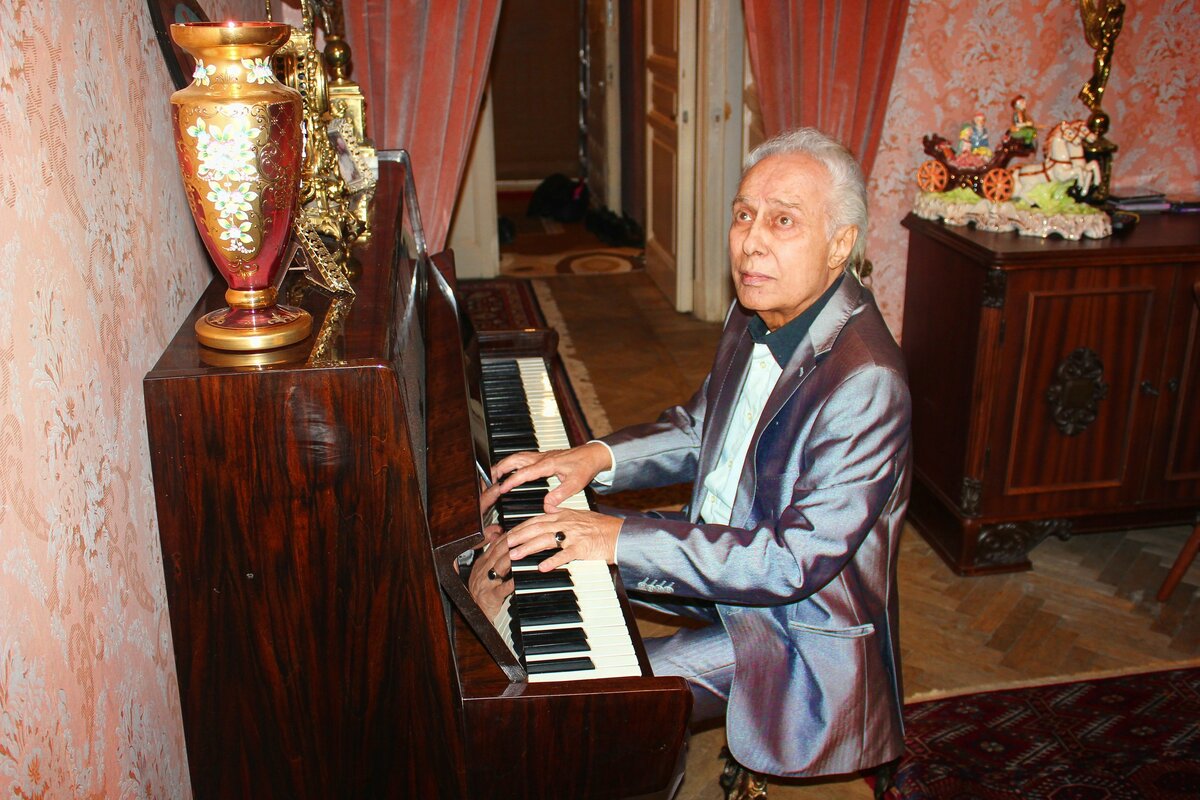
Interview with Nikolay Slichenko
ROMI.HR portal interviewed a prominent Roma actor from Russia and artistic director of Moscow Roma Theater "Romen" Nikolay Slichenko.
Nikolay Slichenko has been at the helm of the Romen Theater since 1977. In addition to being a well-known actor and artistic director of the Romen Theater, he is also a theater director, singer, teacher of acting classes, and public figure. He has won more than 30 state awards. Nikolay Slichenko is the only Roma to have been awarded the title "People's Artist of the USSR".
What goals did Roma intellectuals strive to achieve by advocating for the establishment of a professional Roma theater? How did the creation of the Romen Theater influence Roma in Russia? How did the establishment of the Romen Theater contribute to changing the perception of Roma art and culture in Russia and abroad?
The idea for the creation of a theater as a center for preservation and development of Roma culture appeared in the circles of Roma intellectuals in 1930. The idea was supported by Anatoly Lunacharsky (editor’s remark - Soviet Minister for Education) not only because national theaters generally started to open in the Soviet Union during this period. Since Roma settled in Russia, one could not imagine Russian culture without Roma people and Roma songs. An eminent Roma writer Ivan Rom-Lebedev and theater director Moisej Goljdblat (who became the first artistic director of the Romen Theater) have been at the cradle of the establishment of the Romen Theater.
A grand opening of the Indo-Roma Studio took place on January 24, 1931, and on December 16, actors gave their first music and drama performance based on Alexander German's play "Life on Wheels." The play tells about the difficulties of settling down, about young people breaking with the past. After the premiere, the Indo-Roma Studio was turned into the Romen Theater. Of course, this inspired Roma in different countries to establish cultural institutions. Professional theater campaigns started to appear in many European countries, although much later.
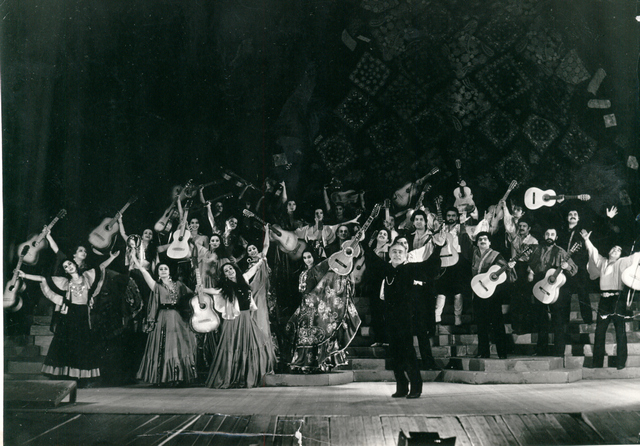
 Almost from the very beginning, the question of the conception of the Theater arose, namely whether “Romen” would be a musical or a drama theater. After 90 years, which of these two directions does the Theater consider its stronger side?
Almost from the very beginning, the question of the conception of the Theater arose, namely whether “Romen” would be a musical or a drama theater. After 90 years, which of these two directions does the Theater consider its stronger side?
Roma art is always a mix of music, singing, and acting. All of our performances are very colorful and are available to everyone due to spectacular dance and singing performances that do not need a translation.
How many actors are there in the "Romen" troupe? What percentage of them are Roma? What is the total number of employees of the Romen Theater?
There are about 58 actors in the troupe, the majority of them are Roma. We are an ethnic theater. There are 150 employees in the Theater in total.
This year marks the 90th anniversary since the Romen Theater was founded. Which period was the most difficult in "Romen's" history? Was there a situation when the Theater was on the verge of closing down? Which period is considered the most successful in the history of the Theater, namely the period of its greatest popularity among the audience?
As for the entire country, the war period was the most difficult (editor’s remark - the period of the Second World War). Actors of the Romen Theater performed in hospitals and in the frontline, strengthening the morale of our soldiers. It was not until 1944 that the Theater returned to Moscow and started to update its repertoire. On May 9, 1945 actors of the Romen Theater celebrated victory in the war by performing on Red Square.
Each generation of actors considers the period of their work in the Theater the most successful, their roles - the most prominent. This is totally understandable, it is the actors' nature.
How many plays have been performed in the entire history of the Romen Theater and how many people have attended these plays? Which plays are considered the most successful?
It is difficult to say, but according to the most conservative estimates certainly more than a hundred performances with approximately 50 million people attending them. Our visiting card is the play "We are Gypsies". June 26 marks the 45th anniversary of the play's first performance. The play is a retrospective of the life of Roma, from the moment they left India until the moment Roma set foot on Russian soil. Roma people left their imprint everywhere while traveling around the world. They survived and adapted to the new conditions. The spirit of freedom and eternal wandering is reflected in songs and dancing performed with incredible passion and temperament. All this is accompanied by stunning male and female vocals, guitar rhythms, violin music, and passionate dances. One can feel the atmosphere of constant celebration despite the difficulties that Roma people are going through.
 How many countries did the Romen Theater tour in total? Which republics of former Yugoslavia did the actors visit? Do you know any examples, when a performance of actors of the Romen Theater motivated Roma in this country to establish Roma theater troupes or ensembles?
How many countries did the Romen Theater tour in total? Which republics of former Yugoslavia did the actors visit? Do you know any examples, when a performance of actors of the Romen Theater motivated Roma in this country to establish Roma theater troupes or ensembles?
The Romen Theater has toured more than 30 countries. We were in Yugoslavia in 1983 with our most recognizable play "We are Gypsies". We performed it 17 times. At that time, it was one country.
In 2019 we went on tour to Romania, and during this tour, representatives of the Ministry of Culture of Romania were discussing with us the idea of opening a Roma theater in Bucharest.
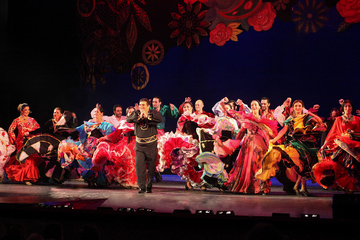
How did the popularity of the Romen Theater change in comparison with Soviet times?
Of course, our loyal fans and their beloved actors have become mature, that is a natural process. Young actors work in a contemporary manner, they are looking for new forms of interaction with the audience and I hope that in the future the Romen Theater will not lose its popularity.
What challenges does the Romen Theater face today? How did the COVID-19 pandemic affect the work of the Theater?
It was a very difficult year, the actors have been deprived of what they consider the most important, namely the opportunity to have direct contact with the audience. We switched to online format as a new form of interaction with the audience, currently, our occupancy rate is 50% in accordance with all the requirements of Rospotrebnadzor (editor’s remark - The Federal Service for the Oversight of Consumer Protection and Welfare). We hope to be able to return to normal life soon.
How is the Romen Theater funded? Is the Theater free in determining its annual repertoire?
The Theater is funded from the budget of the city of Moscow. The Theater is accountable to the Department of Culture, which does not in any way restrict the freedom of creativity and does not interfere in the repertoire policy.
The Romen Theater is probably the most famous Roma theater in the world, which has the longest history. At the same time, over the last 30 years other professional Roma theaters such as the Slovak Theater "Romathan", the Ukrainian Musical and Drama Theater "Romans", the Das Theater TKO in Germany, and others have been established. To what extent in your opinion does the establishment of Roma theaters in other countries contribute to the strengthening of Roma identity as well as raising awareness of Roma culture and art in the countries where Roma theaters are opening?
It is impossible to establish a dialogue between people in a friendly and tolerant way without knowledge and understanding of the culture and mentality of neighboring peoples. In addition, it is important for any nation to preserve the national identity, and culture and art contribute to this to the greatest extent.
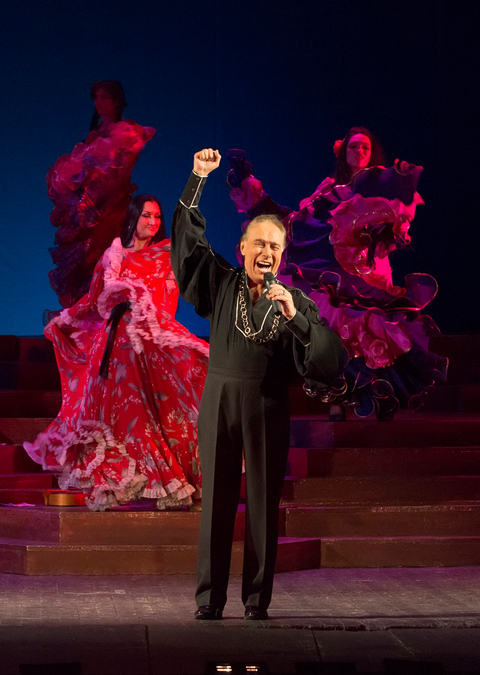
You are an outstanding Soviet and Russian artist, who started working at the Romen Theater at a young age. How difficult (or easy) was it for a talented young man of Roma descent to get a job in a Moscow or provincial theater in Soviet times? Has the situation changed nowadays?
It was after the War (editor’s remark - World War II) when I first heard of the Romen Theater. My mom sent me, at that time just a boy, to our relatives who worked in Roma kolhoz (editor’s remark - a kind of collective agricultural enterprise that was widespread in the Soviet Union). I was very excited! I helped adults as much as I could. In the evening young people sat by the fire and many times I heard them saying: “It would be good for you to work in the "Romen"! They knew that such theater existed. Several years have passed and the elders made a decision to collect several kilos of wheat from each Roma, sell it and for this money buy me a ticket to Moscow. The whole collective farm came to see me off. There were tears, and joy, and fear. Fear, because I did not know what to expect. I was 17 years old. I was just a boy. Of course, I was confused. On the other hand, I knew that there might not be another chance to fulfill my dream.
I arrived in Moscow early in the morning. Somehow, I reached Gorky Street and then Gnezdnikovskaya lane, where "Romen" was located at the time. I knocked on the door. The time is seven o'clock in the morning. My knock caused a stir. "What's the matter?! Who's acting up?!" I answered: "I came to work in the Theater". They laughed. "Are you crazy? Come at eleven o'clock". By eleven o'clock actors started coming to the Theater. Everyone was curious. "Who?' Where from? Why?" I was explaining as best as I could. I waited. During the break, the whole troupe gathered for my audition. I sang. There was no reaction."Can you recite a poem? I could barely remember my mother once reading me "A lonely sail is whitening" (editor’s remark - the first verse of the song "Sail" by the famous Russian poet of the XIX century Mikhail Lermontov). I recited. Silence again. "Can you dance?" I danced. Suddenly young Sergei Shishkov - the Romen Theater leading artist stood up and shouted: "Finally, I see someone who can replace me!" I was shocked when I heard it. Applause followed immediately. In short, I got accepted. I became a supporting actor in the Romen Theater troupe.
Today, such a situation is almost impossible. Our young actors are alumni of theater universities, our national specificity has led to the practice of establishing Roma acting courses to expand the theater troupe (editor’s remark - such acting courses were opened within the famous Gnesin Russian Academy of Music and Boris Shchukin Theater Institute).
*If you want to know more about the history of the Romen Theater, you are welcome to read our article on this topic on our Portal: https://romi.hr/zanimljivosti/hrvatska/devedeseta-godisnjica-kazalista-romen.